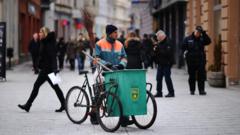In Sarajevo, the Year of the Rat has taken a troubling turn. Social media outlets are flooded with alarming images showcasing an influx of rodents swimming in the Miljacka River, which cuts through the city. These distressing posts are accompanied by complaints from residents of Bosnia and Herzegovina's capital about overflowing rubbish bins and illegal dumping. The most alarming aspect is the city's scant response to reports of dead animals, particularly in places frequented by children, offering a flourishing environment for rats to multiply.
Health experts are sounding the alarm over a significant rise in cases of diseases associated with rats, particularly leptospirosis. Just this week, the largest hospital in the country reported a dozen cases in a single day, following a concerning trend of infections. Leptospirosis, commonly referred to as rat fever, spreads to humans through water or soil that has been contaminated with rodent waste. Its symptoms can range from mild headaches to severe conditions that can lead to liver failure and even death without treatment.
In light of the escalating health threat, local authorities have declared a state of epidemic, allowing them to enact emergency measures such as an extensive clean-up of the city. Municipal teams equipped with disinfectants have been deployed to carry out essential sanitation in public areas, and an increase in rubbish collections has been ordered. Schools are now required to maintain safer playgrounds and ensure rodent control in basements and grassy areas.
This proactive response underscores a stark contrast to past inaction; during the previous two years, Sarajevo witnessed a lack of pest control measures, attributed to a failed tender process for sanitation services. Health Minister Enis Hasanovic has labeled the existing condition as "not merely a health crisis but a communal crisis," pointing to a failure to meet basic hygiene standards.
Former director of Sarajevo's University Clinical Centre, Sebija Izetbegović, who currently holds a position in the Sarajevo Canton Assembly, warns that the situation may worsen with well-fed rats potentially increasing the risk of hantavirus. Sarajevo's residents have experienced a certain level of fortune thus far, as untreated leptospirosis can carry a mortality rate exceeding 50% for severe cases. Fortunately, none of the recent cases have been classified as severe, yet the urgency for effective pest control and public health measures has never been greater.






















